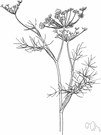A Chinese herbal dating from the 16 th century suggests Star Anise will cure lower back pain and if used in conjunction with fennel (
Foeniculum vulgare), will remedy hernias of the intestines and bladder.
Determination of in vitro antioxidant activity of fennel (
Foeniculum vulgare) seed extracts, Lebensum.
They are a synergistic mixture of the extract from best quality dry leaves of organic rosemary (Rosmarinus officinalis), combined with the organic volatile oil steam-distilled from the best quality dried fruits of fennel (
Foeniculum vulgare).
Among some representatives species of the Apiaceae family, we can mention; the Cuminum cyminum (cumin), Anethum graveolens (dill), Pimpinella anisum (anise) and
Foeniculum vulgare (fennel) and the fennel (
Foeniculum vulgare), plants with culinary and medical applications (Downie et al., 2000).
Bailey,
Foeniculum vulgare Mill., Ocimum basilicum L., Ocimum gratissimum L., and Piper hispidinervum C.
Bioactivity of bioactivity of extracts of
foeniculum vulgare and Ocimum basilicum against Heterotermes indicola (Wasmann).
Among all respondents, the most commonly used herbal medicines were black seed (Nigella sativa) (20%), anise (Pimpinella anisum) (13%), olibanum (Boswellia sacra) (12%), ginger (Zingiber officinale) (11%), fennel (
Foeniculum vulgare) (10%), guava (Psidium guajava) leaf (10%), olive (Olea europaea) oil (9%), thyme (Thymus vulgaris) (6%), chamomile (Matricaria chamomilla) (5%), peppermint (Menthapiperita) (5%), clove (Syzygium aromaticum) (5%), turmeric (Curcuma longa) (4%), costus (Saussurea lappa) (4%), sidr (Ziziphus spina-christi) (3%), myrrh (Commiphora myrrha) (3%), Ivy (Hedera helix) (3%), sesame (Sesamum indicum) oil (3%).
Comparison of Scolicidal Effects of Amphotricin B, Silver Nanoparticles,_ and
Foeniculum vulgare Mill on Hydatid Cysts Protoscoleces.
TIRE HERB OF THE YEAR for 2019 is anise hyssop (Agastache
foeniculum).
This behaviour was not observed in fennel plant (
Foeniculum vulgaris) subjected to salt stress, which did not present their chlorophyll content increased with addition of Si (RAHIMI et al., 2012).
Samples of rosemary powder, common fennel (
Foeniculum vulgare) powder, lemon myrtle (Backhousia citriodora) powder, basil leaves (Ocimum basilicum), wild thyme (Thymus serpyllum) leaves, garden sage leaves, and summer savory leaves were bought from Harissa spice store, Armina Srapca 8,10000 Zagreb, Croatia, and all samples have EU origin; laurel powder and garden sage powder were bought from Farma shop, Meduliceva 18, Zagreb, EU origin; nettle leaves (Urtica dioica) and lemon grass (Cymbopogon citratus) were obtained from Suban d.o.o., 10434 Strmec, Croatia.
Anethole--anise camphor, para-methoxyphenylpropene, CAS number: 104-46-1--is a colorless, crystalline aromatic terpenoid analogue with a characteristic sweet taste and pleasant aroma, occurring in many essential oils obtained from plants belonging to the family Apiaceae, such as anise (Pimpinella anisum), star anise (Illicium verum), fennel (
Foeniculum vulgare), liquorice (Glycyrrhiza glabra), and caraway (Carum carvi) [1-4] (Table 1).
 Foeniculum - very small genus of aromatic European herbs with pinnately compound leaves and yellow flowers
Foeniculum - very small genus of aromatic European herbs with pinnately compound leaves and yellow flowers